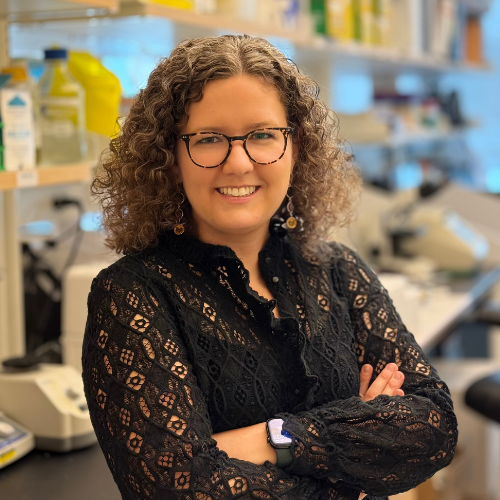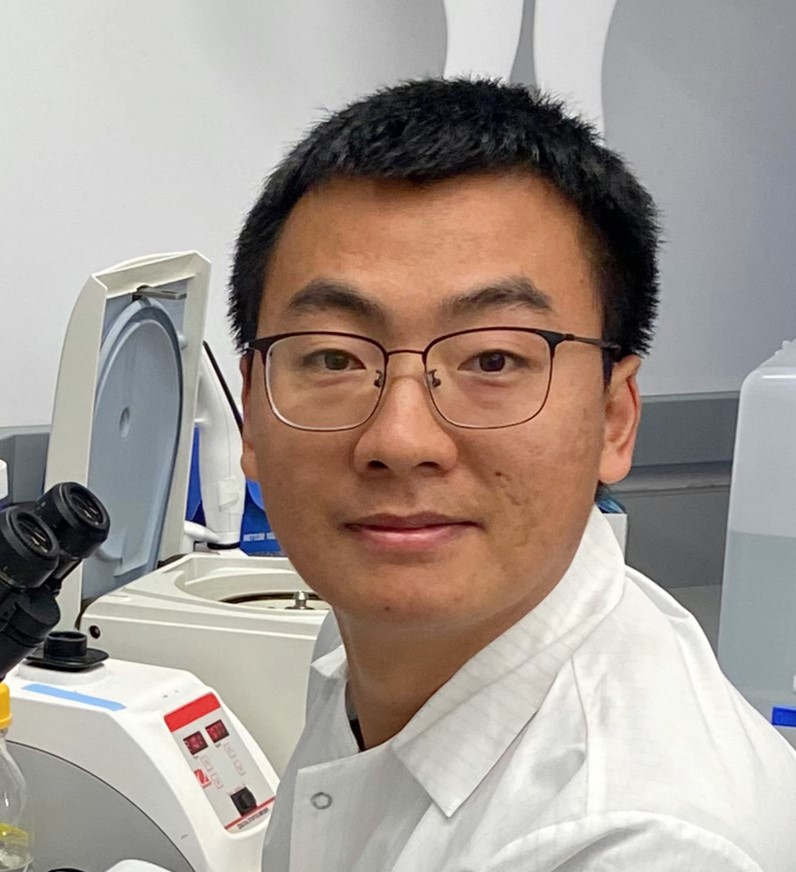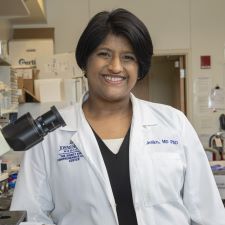Imani Williams

Imani was born and raised in Newport News, Virginia. She attended Howard University, Washington, D.C., as a first-generation college student, earning her BS in Biology with Chemistry and Psychology minors. After graduation, she was selected as a trainee for the New York Research and Mentoring for Post Baccalaureates (NY-RaMP) Program at Hunter College, New York. She worked in Dr. Jill Bargonetti’s (Damon Runyon Fellow ‘91-’94) lab, where she focused her efforts on the study of triple-negative breast cancer research and became passionate about cancer research. She is driven by the challenge of questioning conventional wisdom and exploring seemingly implausible possibilities. She is inspired by the opportunity to reshape the future of medicine, leveraging these innovations for the benefit of all patients. Imani is committed to advocating for those in need, and she believes that pursuing cancer research will allow her to make the most meaningful impact in society.
Alexandra E. Rojek, MD

Dr. Rojek’s [Sijbrandij Foundation Physician-Scientist] research aims to identify why cellular therapies, such as CAR T cells and tumor-infiltrating lymphocytes (TILs), confer long-lasting responses for some cancer patients while others only experience transient clinical benefit. CAR T therapies have transformed the treatment landscape for patients with blood cancers, and TILs have entered wider clinical practice to treat melanoma patients. Dr. Rojek aims to identify the genetic and epigenetic differences in CAR T cells and TILs that are associated with long-lasting versus transient responses. She is also investigating how to promote “memory” formation in CAR T cells, with the goal of translating these findings to early phase trials of cellular therapies for patients with lymphoma or melanoma.
Tamar Kavlashvili, PhD

Mitochondria harbor independent genetic material known as mitochondrial DNA (mtDNA). This compact, circular molecule encodes proteins essential for the assembly of the mitochondrial electron transport chain to generate energy in form of ATP. Like nuclear DNA, mtDNA is susceptible to damage and mutations. One of the most common disease-causing aberrations of mtDNA is termed “common deletion.” This aberration disrupts mitochondrial function, resulting in neuromuscular diseases and potentially certain cancers, including colorectal cancer. Due to a lack of tools to modify the mitochondrial genome, researchers currently do not understand the mechanisms behind common deletion. Dr. Kavlashvili [Timmerman Traverse Fellow] aims to investigate by using cutting-edge molecular biology tools to edit and visualize mtDNA genomes. She will then be poised to unravel impacts of this deletion on various tissues, in order to ultimately mitigate its pathological impact. Dr. Kavlashvili received her PhD from Vanderbilt University, Nashville and her BS from University of Iowa, Iowa City.
Ariën Schiepers, PhD

T lymphocytes, an important component of the immune system, recognize infected or cancerous cells with great specificity, ensuring targeted elimination. These potent cells are kept in check by regulatory T cells, the guardians of the immune system. While essential for curtailing excessive inflammation and preventing autoimmunity, their immunosuppressive properties can promote the development and progression of cancer. Regulatory T cells are distinguished by the presence of a protein called Foxp3, which plays a critical role in their differentiation, function and fitness. Foxp3 deficiency results in fatal autoimmune inflammatory disease, underscoring its importance for maintaining organismal health. Despite its significance, however, the reliance of regulatory T cells on Foxp3 in disease contexts like infection and cancer remains incompletely understood. Dr. Schiepers [HHMI Fellow] will study the fate and function of regulatory T cells in these settings using mouse genetics approaches and disease models of melanoma and colorectal cancer. Dr. Schiepers received his PhD from The Rockefeller University, New York and his MS and BS from Utrecht University, Utrecht.
Shaohua Zhang, PhD

Dr. Zhang [Timmerman Traverse Fellow] aims to engineer T cells with synthetic cell adhesion molecules (synCAMs) to augment current approaches for immunotherapy. This project represents a fundamentally new strategy for CAR T cell engineering that could overcome tumor escape from immunotherapy across multiple forms of cancer. Understanding how synCAMs contribute to CAR T cell efficacy will provide insights beyond cytotoxic CAR T cell therapy; this work could lead to the application of synCAMs in other engineered immune cell therapies under investigation, such as CAR macrophages, CAR natural killer cells, and CAR T regulatory cells. Overall, this approach could lead to CAR T cells that are much more robust to tumor evasion and target antigen expression, and thus much more effective therapeutically. Dr. Zhang received his PhD from University of Chinese Academy of Sciences, Shanghai and his BS from Wuhan University, Wuhan.
Wenzhi Song, PhD

The interaction between cancer cells and their non-malignant neighbors in the tumor microenvironment is critical for cancer progression. While certain types of cellular crosstalk within the tissue safeguard against malignancy, cancer cells are often able to exploit nearby cells to fuel tumor growth. Dr. Song [HHMI Fellow] is interested in understanding how the complex cellular communication network in the skin, namely its sensory and immunological components, contributes to the development of cutaneous squamous cell carcinoma, one of the most common skin cancers. Identifying novel neuronal and immunological interactions within the tumor microenvironment has the potential to uncover pathways regulating cancer progression and anti-tumor immunity. Dr. Song received her PhD from Yale University, New Haven and her AB from Bryn Mawr College, Bryn Mawr.
Megan L. Insco, MD, PhD

Gene expression is a complex process, and sometimes mistakes are made, resulting in the generation of aberrant or “junk” RNAs. Dr. Insco previously discovered that cellular failure to “clean up” this junk RNA can contribute to the development and progression of melanoma. Her work is now focused on targeting aberrant RNA to treat cancer. First, she will identify compounds that specifically target melanomas that are unable to clean up their junk RNAs. Second, she will investigate how immune cells can be activated to attack melanoma cells that have high levels of aberrant RNAs. Many advances in our understanding of RNA biology over the last four decades have resulted in new therapies for patients. As this area of RNA biology is almost completely unexplored, Dr. Insco anticipates that studying mechanisms of aberrant RNA oncogenesis will reveal new therapeutic strategies for patients.
Fyza Y. Shaikh, MD, PhD

Immunotherapy has significantly changed how lung cancer and melanoma are treated. Unfortunately, only a small percentage of patients experience long-lasting responses. Gut bacteria have emerged as a potential predictor of how patients will respond to immunotherapy and may even be adjusted to enhance the effect of immunotherapy. Dr. Shaikh aims to identify features of the gut microbiome that correlate with immunotherapy responses. She will focus on both individual bacteria as they change over the course of treatment and the metabolites made by the entire bacterial community in the colon. The goal of this project, since gut bacteria can be modified, is to develop microbiome-based treatments to be used in combination with immunotherapy to improve response rates or overcome immunotherapy resistance for patients.
Andrew L. Ji, MD
Cutaneous squamous cell carcinoma (cSCC) is the second most common cancer in the U.S. While most cases are caught early and cured with excision, this cancer is more aggressive in the organ transplant recipient (OTR) population, with higher rates of recurrence and metastasis. Treatment options are severely limited in these cases. OTRs require immunosuppression, which is linked to cSCC aggression, but the underlying molecular and cellular mechanisms are poorly understood. Dr. Ji has discovered an invasive cSCC subpopulation that communicates with non-malignant cell types in the tumor’s environment. By profiling OTR tumors using cutting-edge single-cell and spatial technologies, he aims to better understand how this harmful subpopulation emerges in the immunosuppressed setting, aided by crosstalk with these neighboring cells. His goal is to develop strategies for disabling invasion and improving treatment of cSCC in both OTRs and advanced cases in the general population.
McLane Watson, PhD

Cancer immunotherapy has revolutionized the way we treat cancer; however, it is only successful in a small subset of patients. Optimally functioning CD8 T cells, the specialized killers of the immune system, are key to the success of cancer immunotherapies. While CD8 T cell function is highly influenced by their metabolism, little is understood about how metabolism changes the function of these cells. Dr. Watson hypothesizes that metabolism affects CD8 T cell function by altering how tightly its DNA is packaged (its epigenetics), leading to altered gene expression. Using a mouse model of adoptive T cell therapy, a widely used immunotherapy in humans, and epigenetic techniques, Dr. Watson proposes to uncover how metabolism influences CD8 T cell epigenetic landscapes to control their function. He plans to apply these findings to improve T cell function and enhance tumor clearance. Dr. Watson received his PhD from the University of Pittsburgh, Pittsburgh and his BS from Hope College, Holland, Michigan.
